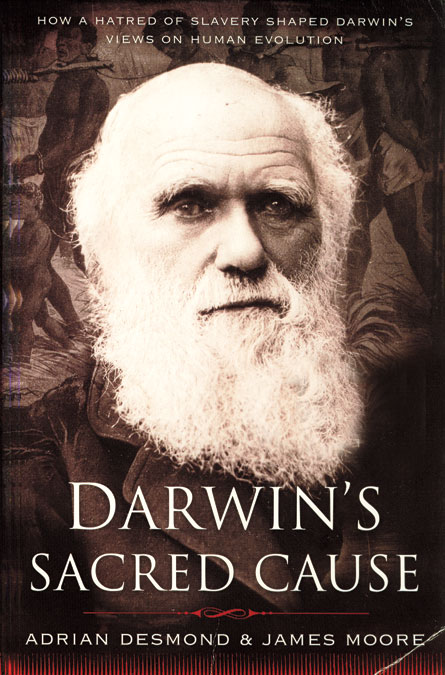Book Review: Darwin’s Sacred Cause: How a Hatred of Slavery Shaped Darwin’s Views on Human Evolution by Adrian Desmond and James Moore
Review by Josh Korenblat
While forming his theory of common descent, Charles Darwin peered beyond his observations of ants, barnacles and blue-footed boobies to try to comprehend a broader subject: human slavery. He encountered the slave trade’s horrors through stories told within his moneyed, abolitionist family. After visiting slave-holding nations on the Beagle, Darwin was forever haunted by the distant cry of a tortured slave, the authors write.
Desmond and Moore, who received acclaim for a 1991 Darwin biography, persuasively show Darwin as a great unifier. He balanced his heated belief in abolitionism with scientific discipline — not letting one affect the other (despite the book’s subtitle). The landmark result: On the Origin of Species with, the authors contend, a refutation of slavery at its heart.
In Darwin’s day, slavery supporters believed black Africans were a species apart from white Europeans. And Africans were fettered to the lowest rung of a natural hierarchy. Darwin confronted this worldview through his bold idea that all animals — including all races of humankind — descend from a common ancestor and change over time.
Slavery was an amoral practice at odds with nature.
By showing Darwin as a participant in the raging scientific debate over slavery, the authors bring him to life. His opponents range from bumbling phrenologists, who believed bumps on the skull determined intelligence, to overt racists, who peddled fables of long-heeled Africans unable to stand on their own. Others seemed to present a more authoritative argument, the authors say, but prejudices corrupted their work.
One scientist, geologist Charles Lyell, was an early mentor to Darwin. Lyell sympathized with slaves but argued that slaves were unable to live without their owners, despite his seeming awareness of the scientific shortcomings in his argument. The book’s portrayal of Lyell as a product of his times highlights Darwin’s true legacy — using the scientific method to overcome the prejudices and polemics of his contemporaries.
Houghton Mifflin Harcourt, 2009, 448 p., $30.
